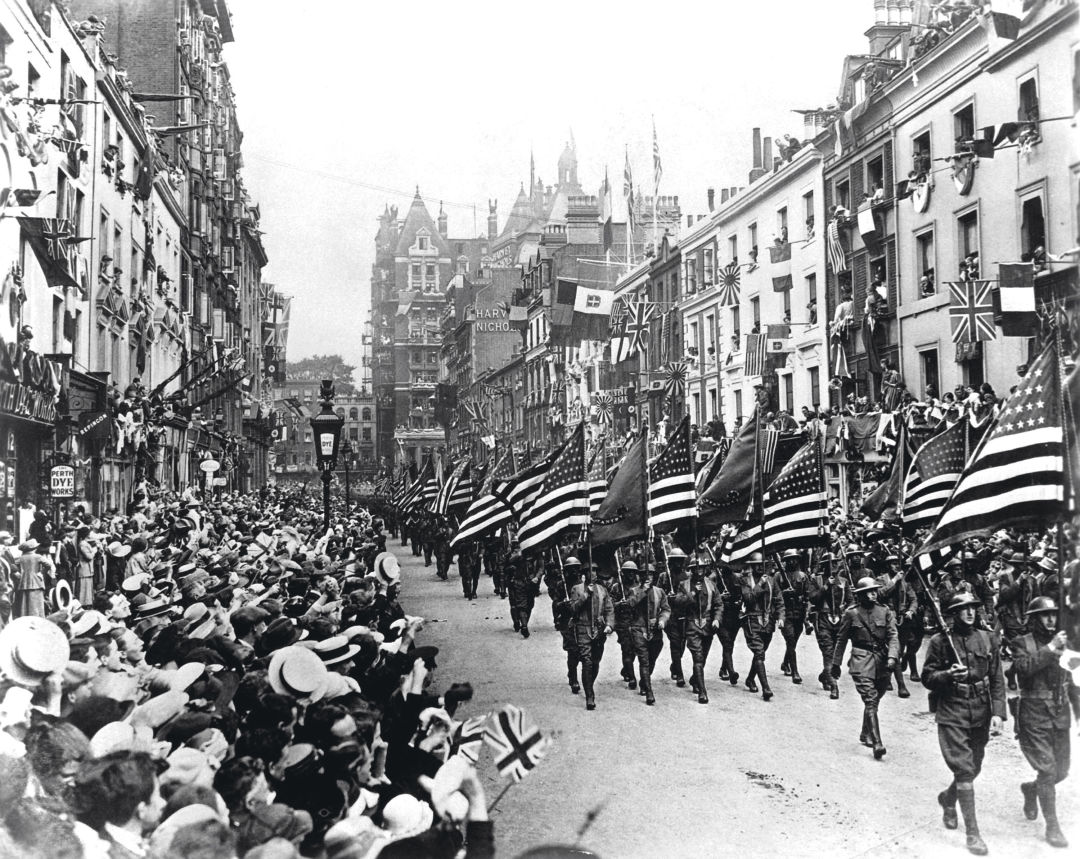A Century Ago, Portland Entered World War I. How Did It Change the City?

American soldiers parade through Perth, Scotland, in 1918.
Capt. Carl Brauch never did anything to earn a reputation as a nefarious enemy agent. But a century ago, the German seaman’s three-masted barque, the Dalbek, was effectively imprisoned in a Linnton harbor. American authorities had interned the ship (and Captain Brauch) when war engulfed Europe in 1914. In April of ’17, the US finally declared war on Germany. Brauch constrained any hard feelings in polite terms. He talked openly with reporters about German military movements mentioned in letters from home. His Portland acquaintances described him as “sanguine” about the Kaiser’s prospects for victory. Meanwhile, German consul Fritz Kirchkoff fretted that his Fatherland had abandoned him. “I guess they have forgotten me altogether,” he told a local dinner party.
Both Brauch and Kirchkoff found themselves sidelined by a waking giant.
The war had already killed seven million people in Western Europe, and many more in Africa, Asia, and the Middle East. As global calamity finally overtook the US one hundred years ago, the war found Portland primed for battle. In just 30 years, the city had mushroomed from 32,000 to 232,000 in 1915, making it the third-fastest-growing city in the nation. Logging dominated, but the river town was itching to diversify. According to historian Adam Hodges, both old-moneyed elites and poor workers recognized that war could mean good things for Portland: the former sought new investments; the latter, to rekindle a dying organized labor movement with an influx of workers.
There was dissent, naturally. Small groups of Portland socialists gathered in Central Library to protest and draft formal appeals to Congress. The most vociferous objections came from Sen. Harry Lane, a former Portland mayor, who had opposed American involvement in Europe’s conflict for years. On April 4, 1917, a severely ill Lane voted against the Declaration of War—one of only six senators to do so. He collapsed on the Senate floor shortly afterward and died en route to Portland.
Oregon’s resistance largely died with him, replaced with a new patriotism that yoked local manpower to Uncle Sam’s war effort. “Oregon’s stalwart sons have no time for sentiment,” the Oregonian would declare that summer, having long condemned the late Lane’s antiwar stance. “And, despite the pleadings of mothers, wives, and sweethearts, the young men, in many instances, will refuse to take advantage of exemptions offered by the Government in the gigantic war draft.” By the end of May, the Oregonian reported, 7,631 Portland men had volunteered to fight—exceeding the state’s allotted quota. Portland became an industrial force, with at least 33,000 people employed in shipbuilding, up from just over 4,000 half a decade before.
As for Captain Brauch, the US seized his ship, rechristening it the USS Monongahela. He was transferred to a detention center at Angel Island in San Francisco Bay. He escaped that winter. When he was recaptured, he said he was just lonely and wanted to see his friends, perhaps those he had met in Portland, once more.



